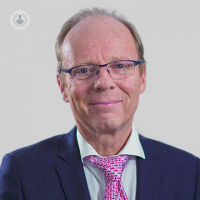Migraines and headaches: FAQs
Autore:Do you know the differences between migraines and headaches? Whilst it’s widely known that migraines are often more intense, there are some other key differences between these two health problems.

We spoke with leading neurologist, Dr Stefan Schumacher , to discuss them. We found out how common migraines and headaches are, what causes them, whether they can be a sign of a serious health issue and how they should be treated. Read on to find out what he had to say.
Are migraines and headaches equally common?
General head pain is more frequent than head pain. However, migraine is a condition that affects many patients, and it is known to be the third most common type of head pain. It affects on average 1 in 7 people worldwide. You find it more often, for instance, in those who have diabetes or asthma. Migraine affects three times more women. In the UK, we have around 190,000 migraine attacks every day.
Are migraines more intense and longer-lasting than headaches?
This depends on the type of headache the patient has a normal headache and is usually less intense. However, there are certain head pain forms like trigeminal neuralgia or cluster headache, which are also complex are often very intense. In general, migraines are more intense as they can last 24-48 hours and, on a pain scale, is normally more severe than with ‘normal headache’.
Can light, physical activity and noise affect migraine and headaches differently?
Migraine patients are very vulnerable to light and noise and definitely more sensitive than patients with normal headache. It has now been evident in the current pandemic, with more people sitting in front of PC screens all day, that this can support and sometimes also cause migraine attacks.
Can migraines and headaches affect hunger and nausea differently?
Patients who suffer from hunger and nausea also often have head pains which can be migraines. On the balance of probabilities, hunger and nausea can equally worsen with both conditions.
Can migraines and headaches be a sign of serious health issues?
This depends on the type of head pain. If we have patients who have never had any head pain and suddenly have extreme head pain, which is, for instance, worsened by coughing, sneezing, or if patients wake up in the night with head pain, then further investigations are needed with for instance a head scan. In many of our patients, migraines and head pain are not a sign of a serious health issue.
Are migraines treated differently from headaches?
In the UK, we have standardised criteria for treatment of migraines, which are licensed by NICE guidelines and are for instance: preventative drugs, emergency drugs and also other treatment such as Botox injections. All these drugs are different to the drugs we use for normal headaches.
If you would like some guidance for treating headaches or migraines, we recommend getting in contact with a highly experienced neurologist such as Dr Stefan Schumacher . Click here to visit his Top Doctors profile today.



